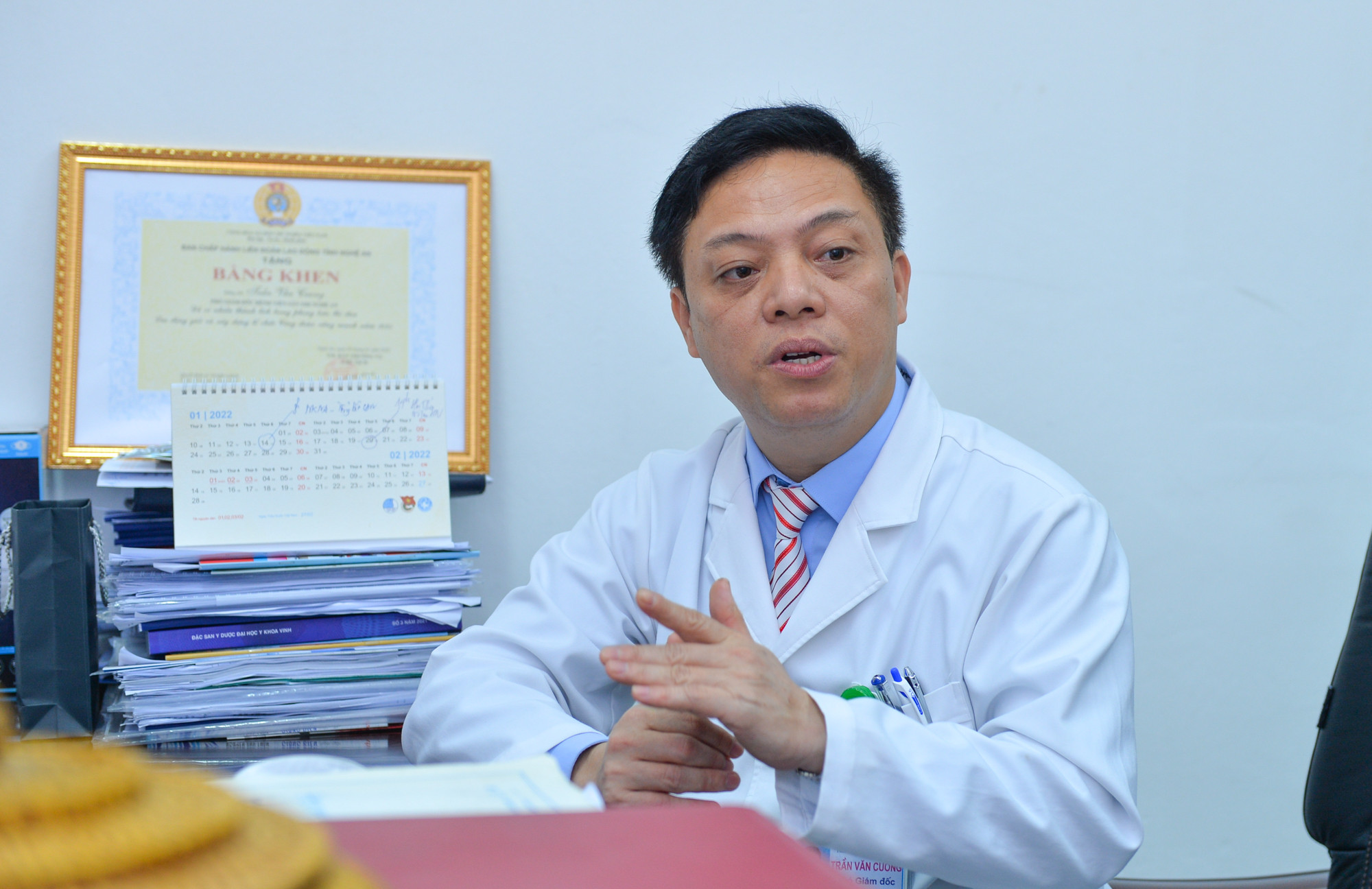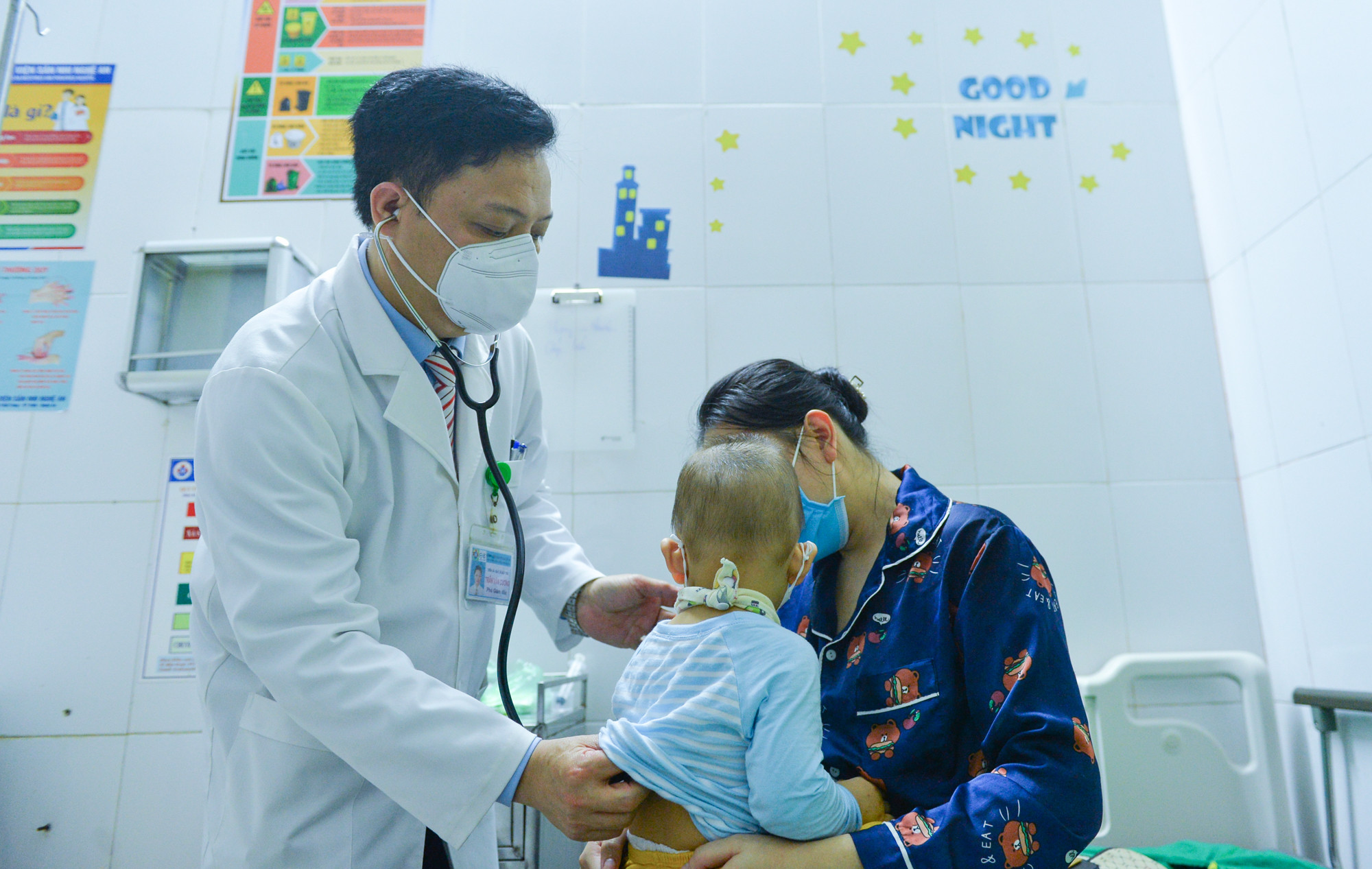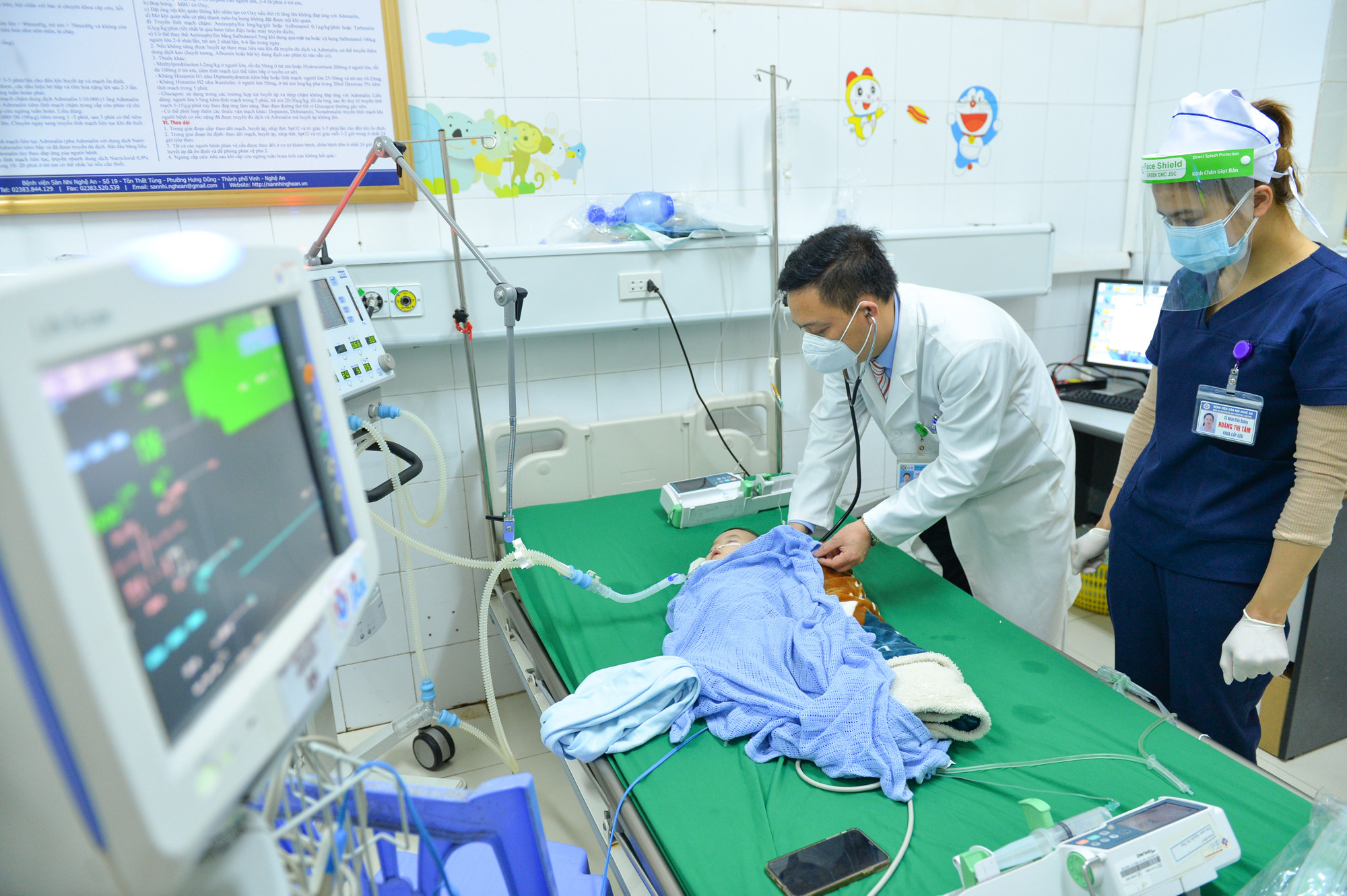How to deal with post-Covid-19 symptoms in children?
(Baonghean.vn) - At Nghe An Obstetrics and Pediatrics Hospital, during these days of changing weather, the number of children who have contracted Covid-19 coming for examination has increased significantly. On average, the Examination Department examines 35-40 children with post-Covid-19 symptoms every day.
Dr. Tran Van Cuong - Deputy Director of Nghe An Obstetrics and Pediatrics Hospital, Chairman of Nghe An Young Physicians Association shared about post-Covid-19 issues, MIS-C syndrome, and reactions after Covid-19 vaccination.
 |
| Dr. Tran Van Cuong shares about the Covid-19 and post-Covid-19 situation in children. Photo: Thanh Cuong |
PV:What is the current situation of children with Covid-19, sir?
Dr. Tran Van Cuong:Currently, the number of children (0-15 years old) withCovid-19The number of children infected with Covid-19 is increasing nationwide as well as in Nghe An province. According to statistics, the rate of children infected with Covid-19 accounts for about 20% of the total cases. The risk and status of children infected with Covid-19 in different age groups are also different. Children in the very young age group infected with Covid-19 account for a low rate, but monitoring and care are more difficult, so some cases require the support of medical staff. Children in the older age group infected with Covid-19 have the same signs and symptoms as adults.
It should be added that children also have underlying medical conditions (obesity, chronic diseases such as asthma, diabetes; congenital heart defects, kidney, ureter, respiratory tract; hemolytic anemia; endocrine diseases, etc.). If these children contract Covid-19, they are also at risk of severe and critical illness.
In recent times, many children have had mild and asymptomatic Covid-19; not many children have been admitted to the hospital with Covid-19 symptoms. In Nghe An, children with severe Covid-19 have been admitted and treated at two facilities, including the Field Hospital and Nghe An Intensive Care Center No. 1. Treatment for children here is facing certain difficulties due to a lack of human and material resources for the Pediatrics Department. Therefore, there have been cases that have had to be transferred to the National Children's Hospital for treatment.
PV:Many families with children infected with Covid-19 are very worried about the post-Covid-19 issue. Can you tell us more about this issue?
Dr. Tran Van Cuong:In adults and older children, the signs and symptoms of post-Covid-19 are often recognized early, which are: Respiratory discomfort, prolonged cough, mild fever, difficulty breathing during exertion, pain in some parts... In the group of young children, the signs and symptoms of post-Covid-19 are exactly the same as in adults but are very difficult to detect because the children themselves are not self-aware of the disease, and cannot pinpoint the exact location.
However, we should not be too panicked about the post-Covid-19 issue. Because when people get any disease, especially virus-related diseases, after recovering from the disease, the body will also have certain crises. This crisis will gradually decrease over time and can be completely adjusted with medical measures.
What needs more attention and attention is that after recovering from Covid-19, children's resistance decreases and they encounter hot and humid weather, microorganisms and bacteria grow strongly, making them susceptible to disease. Parents need to pay attention to keeping warm, improving resistance, protecting children from secondary infections...
 |
| Examination of children with health problems due to post-Covid-19 at Nghe An Obstetrics and Pediatrics Hospital. Photo: Thanh Cuong |
At Nghe An Obstetrics and Pediatrics Hospital, during these days of changing weather, the number of children who have been infected with Covid-19 coming for examination has increased significantly. On average, the Examination Department examines 35-40 children with post-Covid-19 every day. The children often have symptoms of cough and fever. And there are also some children who are seriously ill and have to be hospitalized for intensive treatment. It is known that when the children have symptoms, their families are afraid that the hospital environment is not safe for Covid-19, so they take them to see a doctor and get treatment late.
PV:Among the post-Covid-19 problems, MIS-C syndrome is receiving the most attention. What is MIS-C syndrome?
Dr. Tran Van Cuong:When a virus enters the body, a very strong immune response occurs between the virus and the defense system (white blood cells). The defense system releases many mediators that create antibodies and strong inflammatory reactions, especially in the acute phase. After recovery, the virus is no longer present, but this immune response still exists.
According to medical organizations: After contracting Covid-19, children may develop multisystem inflammatory syndrome (MIS-C). This is a condition in which different body parts can become inflamed, including the heart, lungs, kidneys, brain, skin, eyes or digestive organs... In addition, there are also hypercoagulation and hypocoagulation disorders.
Parents can recognize MIS-C syndrome in children through monitoring and tracking: If there is inflammation in the brain, the child will show signs of drowsiness, learning loss, headaches, and decreased intelligence. If there is inflammation in the lungs, pulmonary fibrosis, when the child runs, jumps, plays, breastfeeds, cries, has difficulty breathing, fatigue, shortness of breath, rapid breathing... With hypercoagulable disorders that cause blockage in the blood vessels, the child may show signs of pain in body parts, the child will play less, cry, and feel uncomfortable in the body.
If inflammatory syndromes appear, families should calmly take their children to the hospital for treatment. During treatment, hospitals will conduct screening tests, ultrasounds, imaging, and use immune gamma globulin, anti-inflammatory agents, and some supportive drugs to control these complications. Severe cases require hospitalization. Mild cases are instructed to go home for monitoring.
PV:There are parents who are hesitant to vaccinate their children against Covid-19, especially children aged 5-11, because of side effects. Are these side effects worth worrying about?
Dr. Tran Van Cuong:Recently, Vietnam has organized Covid-19 vaccination for children aged 12-17 and people aged 18 and over. The vaccine is very effective. In those who have been vaccinated, if they get Covid-19, the clinical symptoms are mild, with few complications; after 5-7 days of infection, the test is usually negative. Children after vaccination can go to school directly.
In essence: Vaccination is the introduction of an antigen into the body. When the antigen enters, it will create reactions and create antibodies. There will be local reactions, systemic reactions with mild or excessive levels. Side effects include chest pain, shortness of breath, palpitations, arrhythmia, myocarditis, pericarditis... However, we should not worry too much, because through surveys of hundreds of millions of people vaccinated, severe and excessive reactions are very rare; mainly transient chest pain.
In Nghe An, there have also been adults who have had strong reactions after vaccination. However, thanks to the complete emergency resuscitation system at all levels, the reactions have been controlled, and no unfortunate incidents have occurred. There have been no strong reactions in children. There have been children aged 12-17 who have had reactions after vaccination, and combined with the sensitivity and anxiety of their age, their parents took them to the hospital and the hospital screened them, gave them simple supportive medication, and psychological measures so the children quickly returned to normal.
 |
| Treatment for children with bad complications due to the effects of Covid-19. Photo: Thanh Cuong |
When it comes to vaccinating children aged 5-11, we should all be bold enough to vaccinate them. We all vaccinate relatives of medical staff when they are indicated to vaccinate. It should be added that if the child has a strong reaction after the first injection, we will not vaccinate them again. With one injection, the body has already received a certain amount of antibodies. If a child unfortunately gets Covid-19, the body will respond very quickly to the immune system and the symptoms will be mild.
With the Covid-19 vaccine, after the injection, immunity will be created in the body. 2 weeks after the injection, the highest level of immunity will be reached. This immunity process gradually decreases. That is why there is advice to have additional injections every 3, 6 months, and every year... When children are vaccinated against Covid-19, family members need to closely monitor the child's condition for 4-6 weeks to recognize the signs.
PV:The number of infections is still increasing rapidly, the Covid-19 epidemic is complicated, do you have any advice for people, especially parents with young children?
Dr. Tran Van Cuong:At this time, the number of Covid-19 cases is still increasing rapidly. However, thanks to the vaccination strategy that has been implemented, Vietnam has controlled the epidemic, the number of severe cases is not high, the mortality rate has decreased sharply (less than 1%, mainly due to underlying diseases). Social activities have not been disrupted, gradually returning to normal... Therefore, we all should not be too panicked or worried.
With Covid-19 or other viral diseases, treatment based on one's own resistance is the most important. When infected with Covid-19, we need to stay calm to treat at home. When at home, patients have good living conditions, care, nutrition, etc. Thanks to that, resistance is increased and the condition becomes less severe. Normally, when the patient has passed the first 3-5 days, the health will be stable and the risk of worsening is not...
When post-Covid-19 symptoms or post-vaccination reactions appear, people should stay calm and go to medical facilities for examination, testing, guidance and treatment. For children, post-Covid-19 symptoms or post-vaccination reactions can be very vague, so monitoring them requires more effort. However, this observation and monitoring needs to be objective and should not be excessive. Excessive care and comfort will lead to children being passive, easily confusing symptoms, and even changing their temperament; it is necessary to create confidence and motivation for children.
At this stage, people should not be too worried about the epidemic, but they should not be subjective, and need to implement "5K" well to reduce infections. Reducing infections will contribute to reducing severe infections, medical facilities will not be overloaded... thanks to which patients will receive better care.
PV:Thank you!


